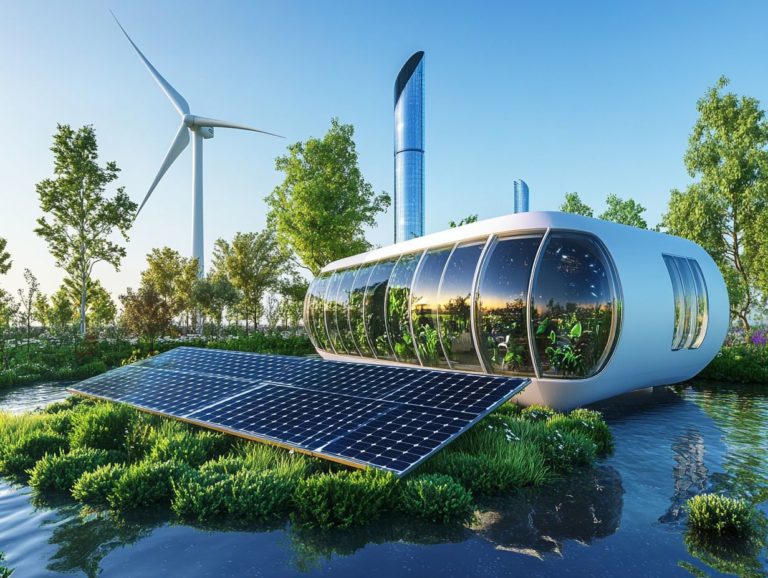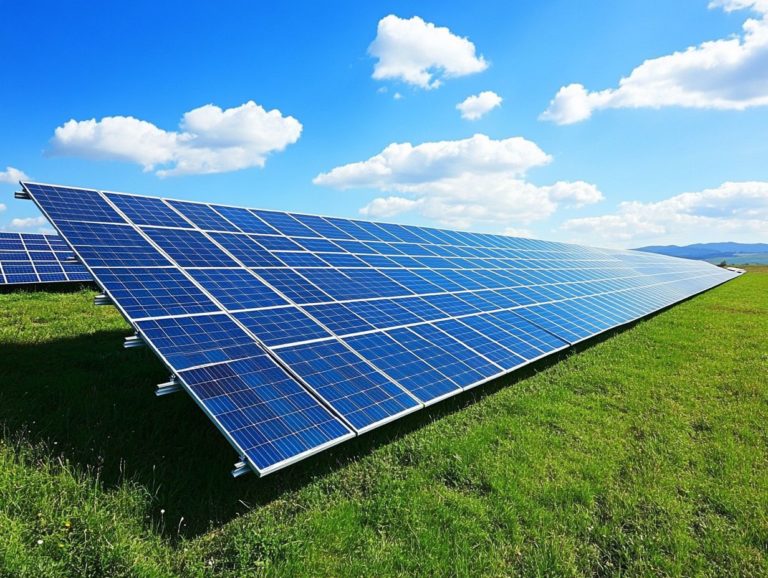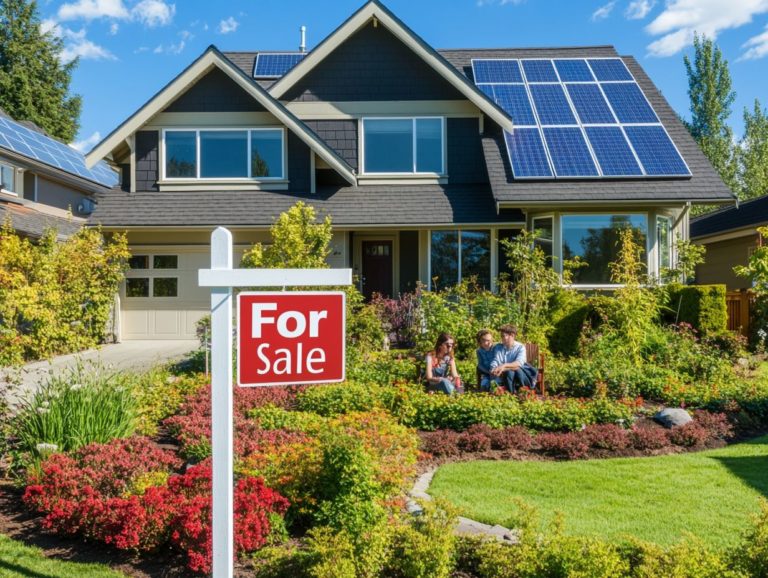“Understanding Solar Energy Financing Options”
Solar energy financing plays a crucial role in making renewable energy accessible and affordable for homeowners and businesses like yours.
With many financing options at your disposal ranging from outright purchases to leases and power purchase agreements it can feel daunting to navigate this landscape.
This article delves into the advantages of solar energy financing. It showcases how it can lead to substantial cost savings while benefiting the environment. We break down the various financing types, government incentives, and key considerations, helping you simplify your journey toward harnessing the power of the sun.
Contents
- Key Takeaways:
- Benefits of Solar Energy Financing
- Types of Solar Energy Financing
- Factors to Consider when Choosing a Financing Option
- Frequently Asked Questions
- What are the different types of solar energy financing options?
- What is a solar loan?
- What is a solar lease?
- What is a power purchase agreement (PPA)?
- What is a property assessed clean energy (PACE) program?
- Is it better to purchase or lease a solar panel system?
Key Takeaways:
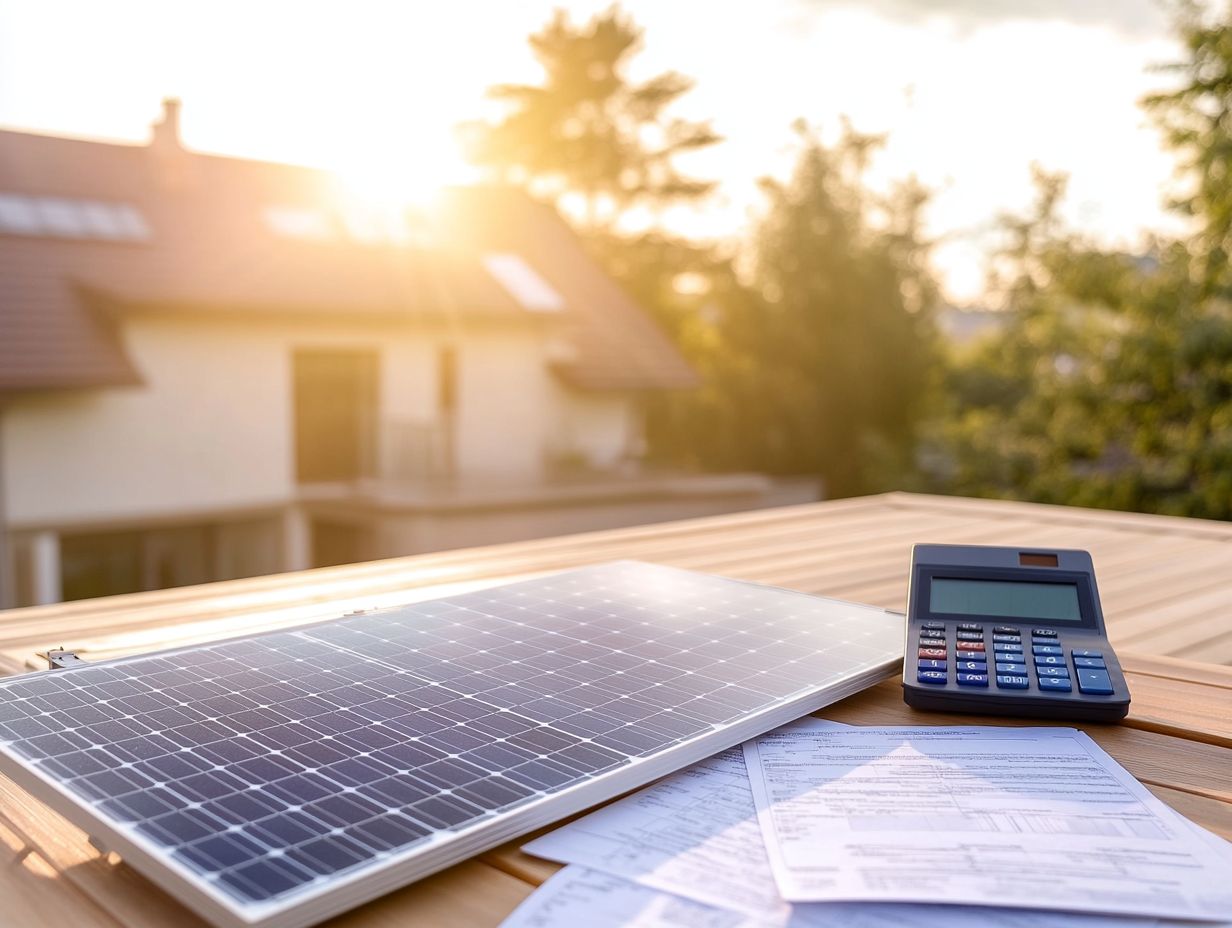
Solar energy financing offers cost savings and a positive environmental impact, making it a smart investment for individuals and businesses. Types of financing options include purchasing, leasing, and utilizing government incentives, each with their own benefits and considerations.
When choosing a financing option, consider your financial goals and budget, solar system size and efficiency, and the long-term vs. short-term benefits.
What is Solar Energy Financing?
Solar energy financing offers a wide array of funding solutions designed specifically for you whether you’re a homeowner or a business aiming to invest in solar panels and renewable energy systems.
This approach helps cover installation costs, which include both hard costs like materials and labor, and soft costs such as permitting and inspection fees.
You have several financing options at your disposal, including personal loans, home equity loans, and specialized contractor financing programs that accommodate various credit scores and loan eligibility requirements.
Evaluating government incentives is key to maximizing your savings and ensuring that the funding meets your financial needs. Solar tax credits, rebates, and low-interest loans can significantly lower your overall expenses.
The loan process typically involves assessing your creditworthiness and project viability, with specifics varying based on your chosen financing option. It’s important for you to consider your energy consumption, property value, and long-term sustainability goals.
By thoroughly exploring these avenues, you can make well-informed decisions that optimize your investment in solar technology, ultimately leading to reduced energy costs and a smaller carbon footprint.
Benefits of Solar Energy Financing
The benefits of solar energy financing are truly multifaceted, presenting you with substantial financial advantages while paving the way for a more sustainable future.
By reducing your electricity bills, you can enjoy long-term energy savings. Many homeowners find themselves eligible for federal tax credits or state incentives that significantly cut installation costs.
Investing in solar panels increases your property value, making it a savvy financial choice that aligns with environmental consciousness.
Cost Savings and Environmental Impact
Cost savings from solar energy financing can dramatically reduce your utility costs while fostering a positive impact on the environment.
You can take full advantage of net metering, which means you earn credits for the extra energy your solar panels produce, effectively slashing your electricity bills even further.
Embracing solar energy not only lightens your financial load but also plays a crucial role in reducing carbon emissions, merging financial gain with sustainable practices.
When you invest in solar panels, the money you save from lower monthly bills can potentially cover the installation costs within just a few years, depending on your local utility rates and available solar incentives.
Federal tax credits, like the Investment Tax Credit, can amplify these savings, enabling you to deduct a significant portion of your installation costs directly from your federal taxes.
As more homeowners make the switch to solar energy, the overall demand for fossil fuels diminishes, resulting in cleaner air and a more sustainable planet.
This choice benefits your budget and the well-being of future generations.
Types of Solar Energy Financing
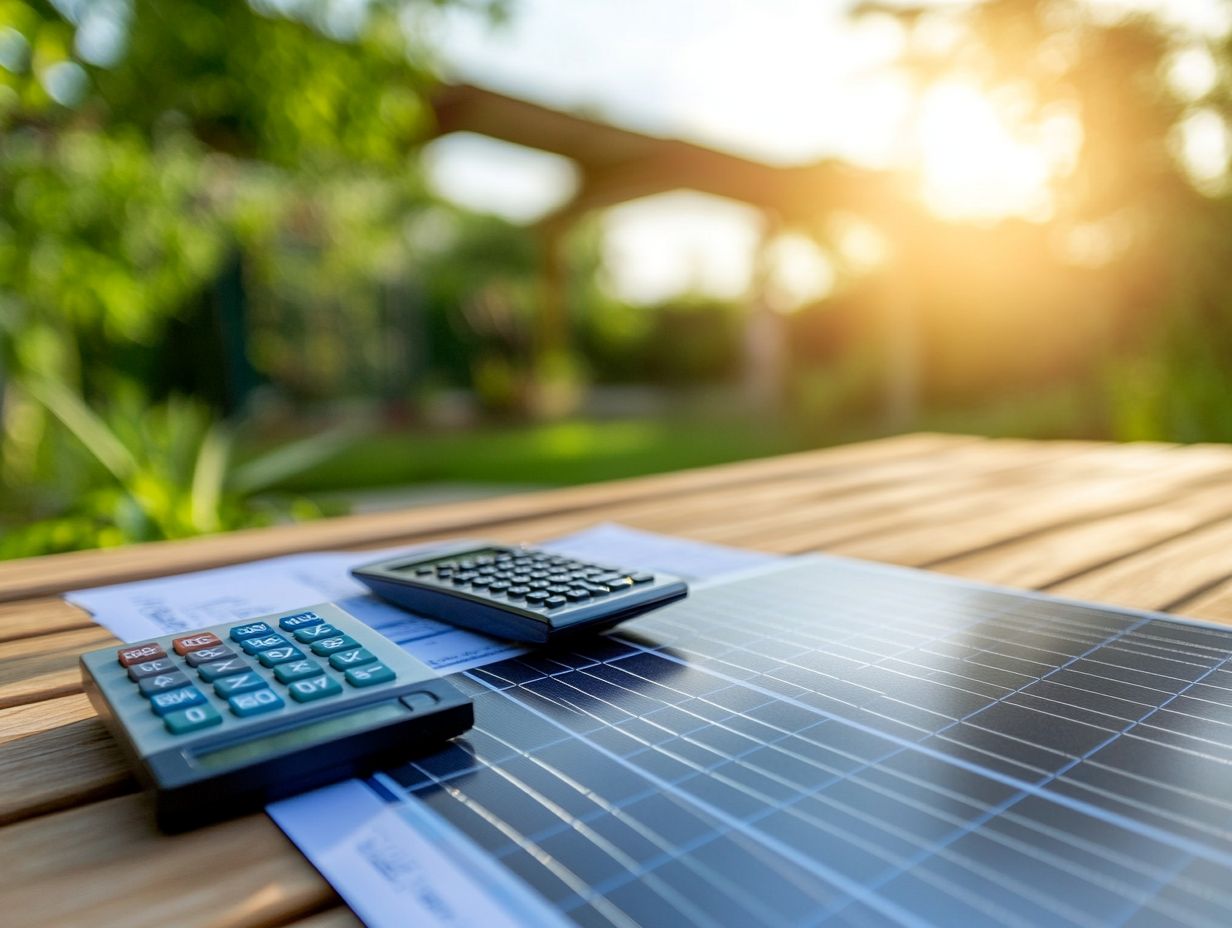
You have several solar financing options available. They are tailored to fit your unique needs and financial situation.
Two popular financing methods are solar leases and power purchase agreements. Solar leases let you install panels without paying a large sum upfront.
Power purchase agreements (PPAs) allow you to pay for the energy generated at a set rate, giving you more predictability in your expenses.
Home equity loans and personal loans are also great options. They provide the funds necessary to cover installation costs while often offering favorable terms and interest rates.
Purchase Options
When considering the purchase of solar panels, you have a variety of financing options suited to your financial situation and goals.
Opting for a direct purchase means full ownership of the solar system. This allows you to take full advantage of federal incentives and tax credits while avoiding ongoing lease payments.
If covering installation costs upfront isn t feasible, equity loans can provide the funds you need without compromising your ownership.
Leasing solar panels is another option, often requiring little to no initial investment. However, you might miss out on significant savings since you won t benefit from federal incentives.
It s important to consider how each financing method impacts you in the long run. The ownership model may require a higher upfront cost but can lead to substantial savings over time, especially as energy costs rise.
Understanding all available options and the impact of incentives can help you make smart decisions that maximize your financial benefits and enhance your energy independence.
Leasing and Power Purchase Agreements
Leasing options and power purchase agreements (PPAs) offer flexible pathways to harness solar energy without the stress of hefty upfront costs.
With a solar lease, you can install panels with little to no initial investment. This means you make predictable fixed monthly payments throughout the lease term.
Alternatively, a PPA allows you to pay for the energy produced at a predetermined rate, easing your financial burden even further.
Both options present unique benefits for those ready to embrace renewable energy. For example, with a leasing arrangement, you gain consistent monthly payments that are often lower than your previous electricity bills, ensuring your budget remains predictable.
A PPA typically locks in a lower rate per kilowatt-hour compared to local utility prices, leading to significant long-term savings. For instance, if you choose a 20-year lease, you could save thousands compared to traditional energy sources while enjoying the reliability of solar power without the headaches of maintenance and repairs, which the solar provider manages.
Government Incentives and Programs
Government incentives and programs are vital for promoting the adoption of solar panels and clean energy solutions. Federal tax credits and state-level incentives can significantly lower your installation costs, making solar energy more accessible for homeowners.
These programs not only encourage a shift to renewable energy but also positively impact the environment by reducing reliance on fossil fuels.
Beyond tax credits, you ll find various financing options available, such as low-interest loans and solar leasing programs. These allow you to invest in solar energy without the burden of upfront costs.
Many states offer rebates and performance-based incentives, rewarding you financially for energy production tied to your solar installation. Eligibility requirements usually include home ownership and installation by licensed contractors, though specific criteria can differ by region.
By reducing initial expenses and providing long-term savings on energy bills, these initiatives make going solar a financially savvy choice for many households.
Factors to Consider when Choosing a Financing Option
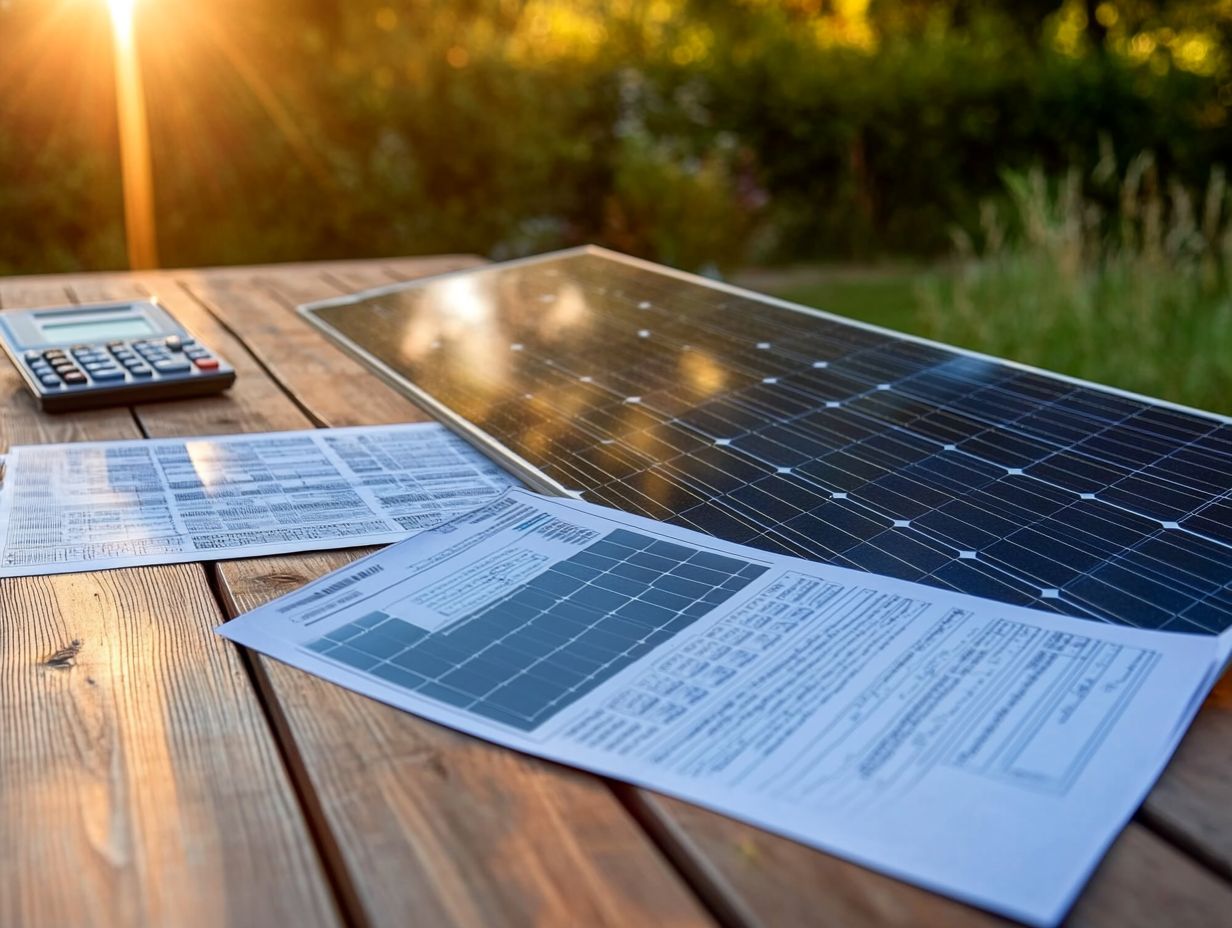
Selecting the ideal financing option for solar energy systems requires thoughtful evaluation of several key factors, including your personal financial objectives and overall budget.
Take the time to check your credit score and examine the loan details presented by various lenders. It s also important to consider the size and efficiency of the solar system you intend to install.
Understanding these elements is essential for making a well-informed decision that aligns with your long-term energy savings and financial security.
Financial Goals and Budget
Start by setting clear financial goals. Clear financial goals and a defined budget are crucial steps in the solar financing process. Evaluate your initial costs against your anticipated energy savings to determine the financing option that aligns with your long-term financial plans.
Understanding the loan process and how various options fit into your overall financial picture is vital for making informed decisions.
To navigate this financial landscape successfully, examine your current energy consumption and expenses closely. This will give you a more accurate estimate of potential savings after installation.
Research available incentives, such as tax credits and rebates, as they can significantly offset those initial costs. By comparing various financing options like solar loans, leases, and power purchase agreements (PPAs), you can find the arrangement that suits your unique financial situation.
Ultimately, a strategic approach could lead to substantial long-term savings, making solar energy a financially viable investment for you.
Solar System Size and Efficiency
The size and efficiency of your solar system are crucial factors that directly impact installation costs and potential energy savings. When determining the right solar system size for your home, consider your energy consumption needs. This will influence your financing options and overall return on investment.
Your credit score can also affect loan eligibility, shaping your financing decisions. By understanding your specific energy usage patterns like peak hours of consumption and seasonal variations you can develop a more tailored solar solution.
This personalized approach ensures adequate energy coverage and can lead to significant cost reductions over time.
Evaluating your options is key. You might choose a smaller, less efficient system with lower upfront costs or opt for a larger, high-efficiency installation for greater long-term savings. This decision is critical for your budgeting strategy.
Collaborating with trusted professionals to assess these factors will help align your investment with your financial goals and energy needs.
Long-term vs. Short-term Benefits
When you evaluate solar energy financing options, it s essential to balance long-term and short-term benefits that align with your financial goals. Short-term advantages might include immediate tax savings and lower monthly payments, while long-term benefits often translate to significant energy savings and an increase in your property s value.
Understanding these factors helps you choose a financing option that maximizes both immediate relief and future financial growth.
For instance, a solar loan may require a larger upfront investment, but it usually leads to greater long-term savings since you own the system outright. Conversely, a lease or PPA might offer lower initial costs, improving cash flow immediately, though the long-term savings potential could be limited.
By carefully weighing your initial costs against future savings, you can make informed decisions tailored to your financial situation.
Frequently Asked Questions
Here are some common questions about solar energy financing.
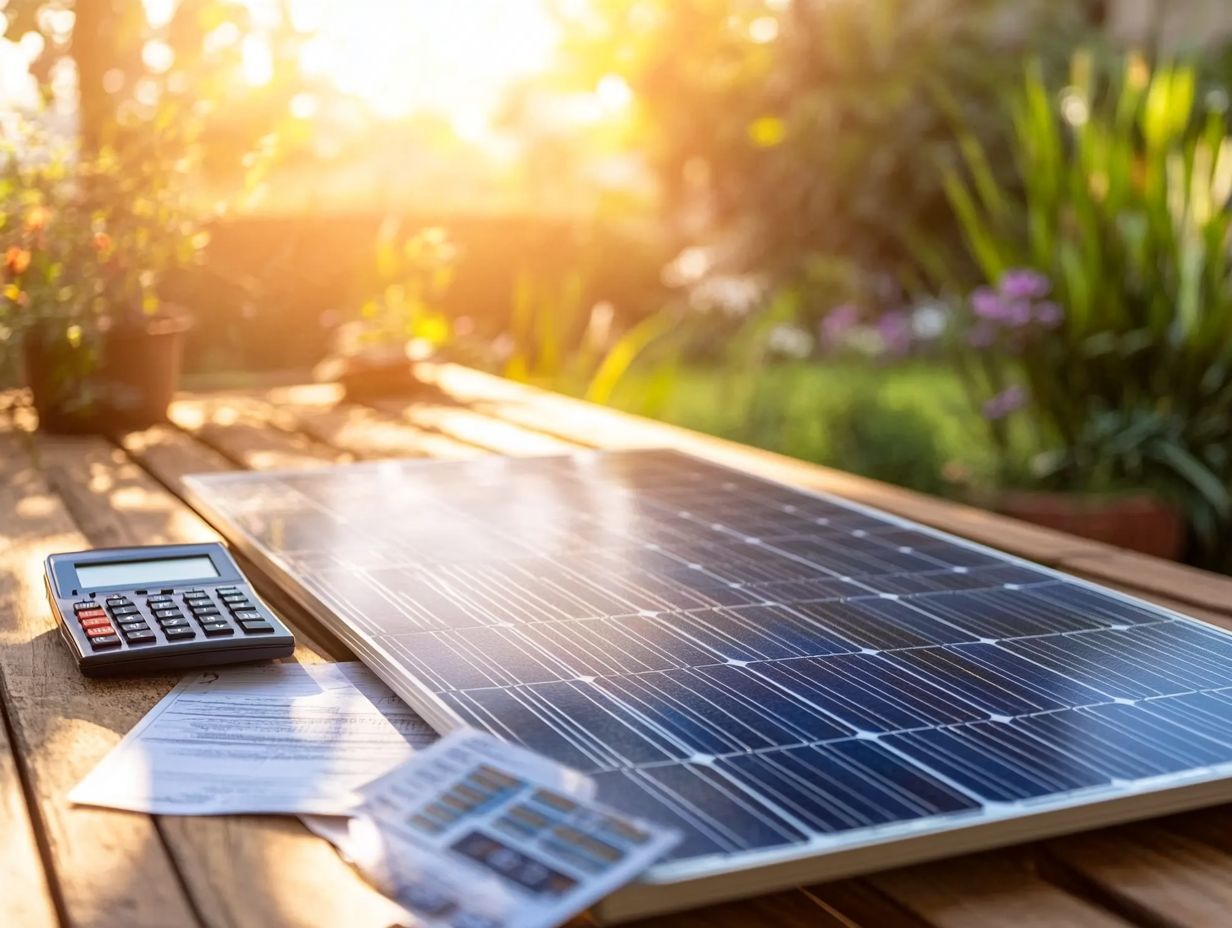
What are the different types of solar energy financing options?
Explore several financing options for solar energy. These include solar loans, solar leases, power purchase agreements (PPAs), and property assessed clean energy (PACE) programs.
What is a solar loan?
A solar loan lets you buy your solar panel system outright. You pay it off over time with fixed monthly payments.
What is a solar lease?
With a solar lease, you rent a solar panel system from a company. You pay a fixed monthly fee while enjoying the energy savings.
What is a power purchase agreement (PPA)?
In a PPA, a third-party company installs and maintains your solar panel system. You agree to buy the electricity it generates at a set rate.
What is a property assessed clean energy (PACE) program?
PACEs provide upfront funding for solar systems through local governments. You repay this funding via an additional property tax assessment.
Is it better to purchase or lease a solar panel system?
Your choice depends on your financial goals! Buying often means more long-term savings, while leasing usually needs little to no upfront money. Compare your options to find the best fit for you.


